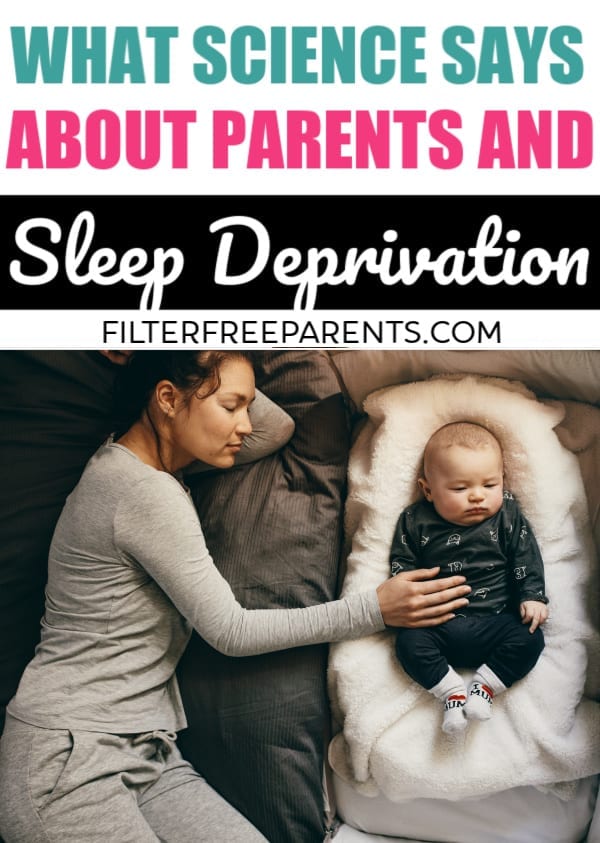One of the most difficult aspects of being a new parent is the chronic, crippling exhaustion that comes with caring for a newborn. There’s a reason that sleep deprivation is used as a torture tactic… because being deprived of sleep IS torture.
Well, I don’t want to scare you, newbie parents, but you’re about to find out a dirty little secret that we veteran parents are keeping from you. Oh, sure, we might tell you that you’ll get more sleep once your child is no longer a newborn, but… we’re LYING.

The truth is, sleep deprivation lasts way longer than the first few months of infancy.
It’s science. No, seriously- science has recently confirmed that parents are deprived of solid sleep way, way, way longer than that. We’re talking years, people (and yes, most of us already knew that *yawn*.)
A recent sleep study was conducted in order to gauge the sleep patterns of brand-new parents when compared to the results several years later. Researchers studied the sleep of 4500 parents between the years of 2008-2015 in order to assess what, if any, changes occurred over time.
The bottom line: Parents experience consistent sleep deprivation for an average of six years after a child is born.
Yep, that’s right- SIX YEARS. And what’s even more disillusioning, the researchers reported that the individuals studied wholeheartedly agreed that sleep satisfaction was “never truly recovered”.
Are you crying? Because I’m crying. My oldest is 16, my youngest is 5, and I’m pretty sure I haven’t gotten a full night’s sleep in, oh, 16 YEARS. Apparently we’re in this sleep-suck for the long haul, folks.
Moms lose more sleep than dads. It’s science.
According to the study, mothers lost more than an hour of sleep each night for the first few months (only one hour? Did these parents win the baby lottery or what??). Fathers, on the other hand, slept 15 minutes less in the first three months. 15 MINUTES LESS.
Dr. Sakara Lemola, a professor of psychology at the University of Warwick, states that mothers tend to suffer more:
Women tend to experience more sleep disruption than men after the birth of a child reflecting that mothers are still more often in the role of the primary caregiver than fathers.
You think?? While there are certainly dads that stand in the sleep gap, moms typically bear the brunt of it (and that’s why sleep-deprivation mom rage is a real thing…).
Breastfeeding moms lose more sleep than their formula-feeding peers.
That’s not implying that formula-feeding moms aren’t sleep-deprived as well, of course! But nursing moms reported the greatest level of sleep deprivation; as baby turned six months of age, they were still reporting the greatest amount of sleep dissatisfaction.
Having a human being vacuum-sucking your nipple can do that to a person… and let’s not even get started on when baby starts teething!
First-time parents experience a more profound affect on their sleep than experienced parents.
That’s definitely accurate; I’m sure you can still vividly remembering the crushing exhaustion of waking up frequently with your first child. If you have multiple children, however, you manage to adapt to the loss of sleep… better, anyway. You’re still exhausted AF, but you manage to plow through you day while caring for a newborn and older kids.
While most of this research makes sense in terms of caring for an infant, it’s the duration of sleep deprivation that is disheartening, and painfully obvious to most parents of older children.
 We expect those first few months to be exhausting. We anticipate being up most of the night with our babies. But we also expect, falsely, to be able to “finally sleep through the night!” once our baby does. WRONG!
We expect those first few months to be exhausting. We anticipate being up most of the night with our babies. But we also expect, falsely, to be able to “finally sleep through the night!” once our baby does. WRONG!
Once the child was 4-6 years old, sleep duration was still about 20 minutes shorter in mothers and 15 minutes shorter in fathers.
Yep. Even though everyone is in theory sleeping through the night, the quantity and quality of that sleep is simply NOT what it used to be prior to parenthood. And that makes sense.
How many times has your toddler woken you up in the middle of the night to tell you he or she wet the bed? You change their clothes, change the sheets (or throw a quilt on it!) and get your kid back to sleep…. or try to. And they finally DO fall asleep, and then it takes you a good 15 minutes to fall back to sleep.
Then you finally do, only to be awoken by another child, who wants you to know her dolls woke her up because they were “talking about me again”. Then you don’t fall asleep until the sun starts to rise, because GHOSTS. But just as you do, the same pee kid comes back… because he peed on the quilt.
You grow accustomed to sleeping lightly. Most of your body may be asleep, but your parent brain is still whirring, still listening and anticipating the next awakening.
Welcome to the rest of your life, new parents. As author Sakari Lemola explains it, sleep deprivation is simply par for the course:
While having children is a major source of joy for most parents it is possible that increased demands and responsibilities associated with the role as a parent lead to shorter sleep and decreased sleep quality even up to 6 years after birth of the first child.
And lest you think you’ll miraculously get better sleep once your kids are even older, just wait until they’re teenagers and still not home by their midnight curfew… how about a study on THAT??












Hahaha, ‘the pee kid comes back again’ mad me laugh so hard.???